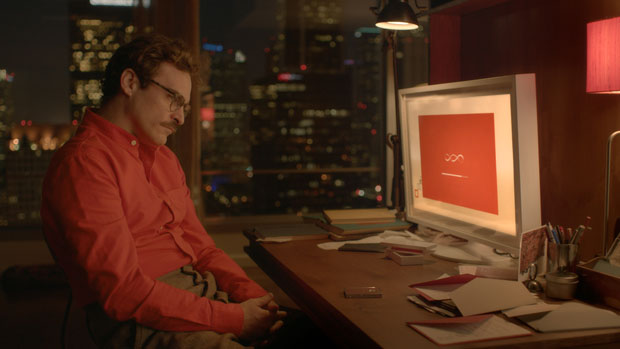Spike Jonze’s Her & Technology
As a mobile product designer I’ve tried to implement forward thinking interfaces and ways to connect with consumers ranging from augmented reality to adapting for subways to image recognition. With the recent nominations and awards for Jonze’s film Her, it’s worth visiting the movie’s creative vision of mobile interfaces and the implied infrastructure that supports it.
If you haven’t seen the film, in the not too distant future, the protagonist Theo buys a new type of operating system powered by artificial intelligence. He subsequently falls in love with the OS, which sets up many of the situations involving this future’s mobile interfaces and infrastructure.
The Future Of Mobile
Voice recognition becomes the primary mobile input, but there’s no need for “Ok Glass” or “Xbox One” to trigger a response. This is likely the result of voice recognition going beyond just comprehension of spoken words, but also utilizing voice identification and understanding tone as well. Theo’s operating system Samantha often detects his intentions and concerns simply from the tone of his voice. An advanced form of voice identification would go a long way to making present day voice input a more regular mobile interface beyond Siri. I’m intrigued by the possibilities although voice commands might become a public nuisance. When Theo is audibly skipping music tracks over and over on an elevator, you might expect those sharing the elevator to tell him to make up his mind. Still, this would be useful for those times you’re stuck on a packed L Train and can’t reach your phone to skip a song.

Audio is the new augmented reality in this future. Cycling through emails, getting the weather report, and retrieving voicemails are purely an auditory experience with no visual interface needed. In many ways it’s reminiscent of one the most successful hands free experiences, the spoken directions of GPS navigation. In general mobile screens are rarely seen in the film. Of the few times Theo does glance at his phone’s screen it is mostly to see who’s calling or to view the occasional crude photo, showing that some things never change. Whether he’s at work or composing a personal letter to his ex-wife, it’s all done through speech.
Light plays an interesting role too, and I don’t just mean the automated lights following Theo around in his home. Android and BlackBerry phones have used light signals to indicate phone actions for years, and in Her’s future this is no different. The mono earpiece, the central human interface device in the film, lights up when there is a call. Samantha even uses subtle light intensity from the phone to gently see if Theo is awake without using a ringtone, which might disturb his sleep. Calling someone without ringing them is a clever mobile interface that I hope gets adopted. At a minimum the functionality of the “do not disturb” and nighttime modes of modern phones would be improved.
Theo’s interactions with Samantha are undaunted by mass transit, elevators, browsing the mall, and long days out exploring, all while talking and streaming live video back to her. This implies that the infrastructure supporting mobile interactions has a ubiquitous ultra high-speed connection that works everywhere from elevators to mountains. It also implies that the constraints of mobile battery life are no longer a concern in this future. It might be hard to wrap your hands around this today since you can’t play Angry Birds for more than an hour before draining your phone. For reference, after about 10 minutes of video recording and 10 minutes of browsing on the most recent version of Google Glass, it’s nearly half drained. Is there some kind of wireless charging technology at work in Her? There’s nothing explicitly said, but one can’t help wondering how Theo can stream his whole day to his virtual girlfriend.
Later on in the film you’ll realize that people have one continuous operating system for all their device platforms. Theo’s phone, his work computer, and his home computer are all one unified OS. In this future you wouldn’t own an iPhone, work on a Windows PC and use an Android tablet at home. It’s all one software platform. If one goes down they all go down.
Moreover, Her represents a shift towards a universal OS that supports your digital life wherever you are, blurring the lines around what is considered “mobile.” It’s not a new concept in the present day, but an interesting representation of it fully manifested in the future.




